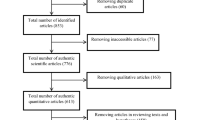Abstract
This paper presents an original essay that explains how managerial psychology affects the efficiency of transport firms. Stochastic frontier analysis methods are applied to our sample over a 12-year period from 2000 to 2011, where we aim to detect the potential effect of a well-documented bias in behavioral economic and finance theory: the managerial optimism bias. We initiate a debate concerning the potential role of Chief Executive Officers’ (CEO) irrationalities in explaining the inefficiency of public transport operators, such as the shortfall between the optimal production function and the observed production level. We find strong evidence of the negative impact of CEOs’ optimism bias on transport firms’ technical efficiency, meaning that managerial optimism decreases transport firms’ technical efficiency.
Similar content being viewed by others
Notes
It is noteworthy that the gamma value cannot be considered to be a proportion of the variance of the technical inefficiency effects in relation to the total of the variances of the technical inefficiency effects and the random variation (Coelli and Battese 1996).
References
Aggarwal R (2014) Animal spirits in financial economics: a review of deviations from economic rationality. Int Rev Financ Anal 32:179–187
Aggarwal R, Zong S (2008) Behavioral biases in forward rates as forecasts of future exchange rates: evidence of systematic pessimism and under-reaction. Multinatl Finance J 12(3):241–277
Aggarwal R, Lucey BM, O’Connor FA (2014) Rationality in precious metals forward markets: evidence of behavioural deviations in the gold markets. J Multinatl Financ Manag (forthcoming). Available at SSRN:http://ssrn.com/abstract=2437444
Barnum DT, Karlaftis MG, Tandon S (2011) Improving the efficiency of metropolitan area transit by joint analysis of its multiple providers. Transp Res Part E Logist Transp Rev 47:1160–1176
Barros CP, Peypoch N (2010) Productivity changes in Portuguese bus companies. Transp Policy 17(5):295–302
Battese GE, Coelli TJ (1995) A model for technical inefficiency effects in a stochastic frontier production function for panel data. Empir Econ 20:325–332
Brown R, Sarma N (2007) CEO overconfidence, CEO dominance and corporate acquisitions. J Econom Bus 59(5):358–379
Buehler R, Griffin D, Ross M (1994) Exploring the “planning fallacy”: why people underestimate their task completion times. J Pers Soc Psychol 67:366–381
Campbell J (2000) Strategic asset allocation: portfolio choice for long-term investors. NBER Reporter, pp 8–13
Chu X, Fielding GJ, Lamar BW (1992) Measuring transit performance using data envelopment analysis. Transp Res Part A Policy Pract 26(3):223–230
Coelli TJ (1996) A guide to Frontier Version 4.1: A computer program. University of New England, Armidale, Australia
Coelli TJ, Battese GE (1996) Identification of factors which influence the technical inefficiency of Indian farmers. Aust J Agric Resour Econ 40(2):103–128
De Borger B, Kerstens K, Costa Á (2002) Public transit performance: what does one learn from frontier studies? Transp Rev 22(1):1–38
Habib MA, Ljungqvist AP (2005) Firm value and managerial incentives. J Bus 78(6):2053–2094
Hayward M, Hambrick D (1997) Explaining the premiums paid for large acquisitions: evidence of CEO hubrfs. Adm Sci Quart 42:103–127
Heaton JB (2002) Managerial optimism and corporate finance. Financ Manag 31(2):33–45
Huang W et al (2011) Agency cost, top executives’ overconfidence, and investment-cash flow sensitivity: evidence from listed companies in China. Pac Basin Finance J 19:261–277
Jarboui S, Boujelbene Y (2012) The behavioral approach and the rationality of economic decisions: application to banks managers. Glob Bus Manag Res Int J 4(2):205–219
Jarboui S, Forget P, Boujelbene Y (2012) Public road transport efficiency: a literature review via the classification scheme. Public Transp 4(2):101–128
Jarboui S, Forget P, Boujelbene Y (2013a) Efficiency evaluation in public road transport: a stochastic frontier analysis. Transport. doi:10.3846/16484142.2013.78019
Jarboui S, Forget P, Boujelbene Y (2013b) Public road transport efficiency: a stochastic frontier analysis. J Transp Syst Eng Inf Technol 13(5):64–71
Jarboui S, Forget P, Boujelbene Y (2014) Inefficiency of public road transport and internal corporate governance mechanisms. Case Stud Transp Policy 2(3):153–167
Kahneman D, Tversky A (1979) Prospect theory: an analysis of decision under risk. Econometrica 47:313–327
Karlaftis MG (2009) Ownership and competition in European transit: assessing efficiency. Transportmetrica 6(2):143–160
Karlaftis MG, Tsamboulas D (2012) Efficiency measurement in public transport: are findings specification sensitive? Transp Res Part A 46:392–402
Kumar S (2011) State road transport undertakings in India: technical efficiency and its determinants. Benchmarking Internat J 18(5):616–643
Lin Y, Hu S, Chen M (2005) Managerial optimism and corporate investment: some empirical evidence from Taiwan. Pac Basin Finance J 13:523–546
Malmendier U, Tate G (2005a) CEO overconfidence and corporate investment. J Finance 60(6):2661–2700
Malmendier U, Tate G (2005b) Does overconfidence affect corporate investment? CEO overconfidence measures revisited. Eur Financ Manag 11(5):649–659
Malmendier U, Tate G (2008) Who makes acquisitions? CEO overconfidence and the market’s reaction. J Financ Econ 89(1):20–43
Oliveira A (2007) A discussion of rational and psychological decision-making theories and models: the search for a cultural-ethical decision-making model. Electron J Bus Ethics Org Stud 12(2):12–17
Pawlina G, Renneboog LDR (2005) Is investment-cash flow sensitivity caused by agency costs or asymmetric information? Evidence from the UK. Eur Financ Manag 11(4):483–513
Saxena P, Saxena RR (2010) Measuring efficiencies in Indian public road transit: a data envelopment analysis approach. Opsearch 47(3):195–204
Simon HA (1980) The behavioral and social sciences. Science 209:72–78
Sivanathan N, Galinsky AD (2007) Power and overconfidence. Working paper. IACM
Weinstein ND (1980) Unrealistic optimism about future life events. J Pers Soc Psychol 39:806–820
Author information
Authors and Affiliations
Corresponding author
Rights and permissions
About this article
Cite this article
Jarboui, S. Managerial psychology and transport firms efficiency: a stochastic frontier analysis. Rev Manag Sci 10, 365–379 (2016). https://doi.org/10.1007/s11846-014-0149-1
Received:
Accepted:
Published:
Issue Date:
DOI: https://doi.org/10.1007/s11846-014-0149-1




